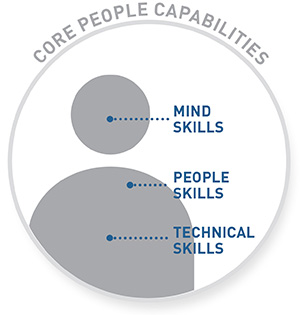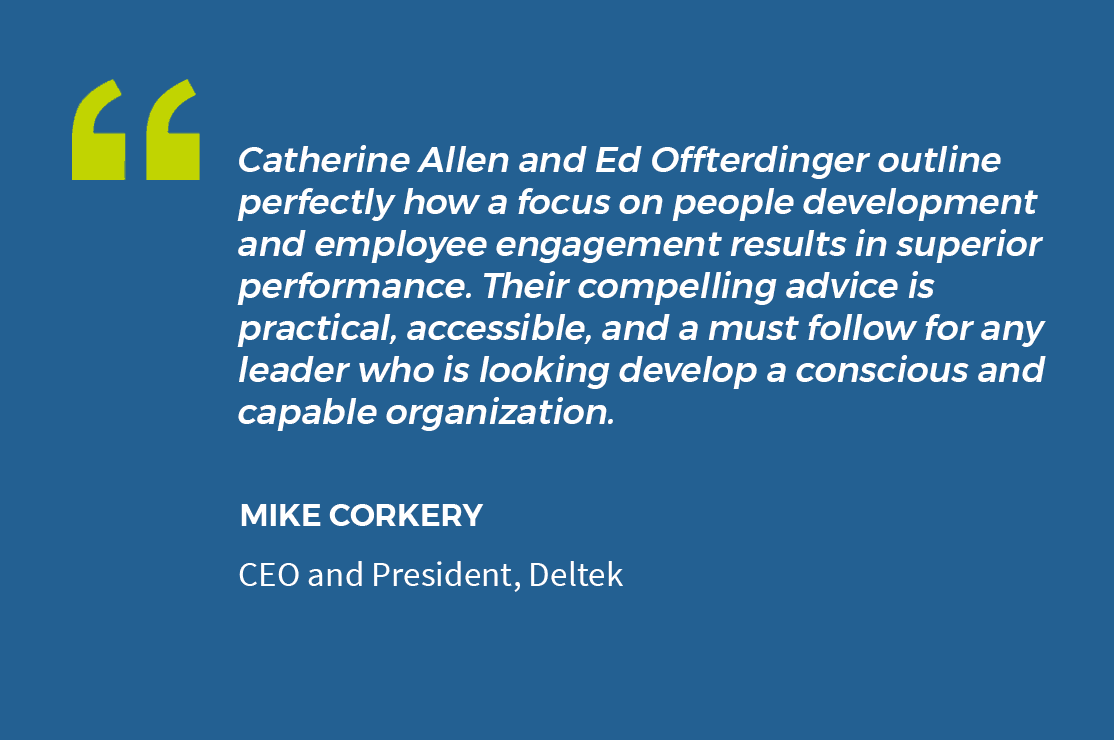MIND SKILLS + PEOPLE SKILLS

Our Core People Capabilities identify the most critical Mind Skills + People Skills + Technical Skills needed to successfully flourish at work. By identifying strategic key capabilities to focus on throughout the Conscious Development Employee Life Cycle, our clients experience increased sustainable business performance and benefit from the development of more capable people.
A simple but powerful model, our Mind Skills + People Skills + Technical Skills provides both employer and all employees with a practical road map for understanding the core people capabilities employees need to succeed and thrive at every stage of their career.
Mind Skills
Mind Skills are embedded in the brain’s cognitive function and are closely associated with learning and problem solving.
| CAPABILITY | DEFINITION |
|---|---|
| EXECUTIVE FUNCTION SKILLS (CORE CAPABILITY) | The brain-based skills enabling focus, organizing and planning, understanding of different points of view Focus: Centering one’s attention on a task or project and bringing it to completion Organizing, Planning, and Prioritizing work or project Different points of view: Surfacing and challenging underlying assumptions |
| GROWTH MINDSET | Belief that most basic abilities can be learned through dedication and hard work(1) |
| ADAPTABILITY | Capacity to reflect dynamically amid constantly shifting work landscape Ability to be resilient and recover from setbacks Ability to think, move, and change quickly (i.e., agility) |
| CRITICAL THINKING | The objective analysis and evaluation of an issue in order to form a judgment Testing claims for truth Surfacing and challenging underlying assumptions Widening the scope of inquiry Awareness of unconscious bias |
| CURIOSITY | Desire to learn, know ,and understand. Fueled by inquisitiveness. |
| CREATIVE THINKING | The process of generating new and imaginative ideas and solutions. Happens best in psychologically safe(2) environments which enable inspiration or innovation. |
| DECISION MAKING | Ability to make quality decisions in a timely manner, taking into consideration uncertainty and the possibility of not having complete information. |
People Skills
People Skills are the inter-personal and behavioral skills and abilities, such as the ability to know oneself and to communicate and relate to others effectively on a personal and professional level.
| CAPABILITY | DEFINITION |
|---|---|
| EMOTIONAL INTELLIGENCE (EQ) (CORE CAPABILITY) | Ability to manage one’s emotions in the workplace, home, and community through self-awareness, self-control, self-motivation, and empathy Self-Awareness: Awareness of what one is feeling and thinking and how it informs thoughts and behaviors, understanding the impact on others. Understanding one’s strengths and weaknesses. Clearly seeing how others perceive us. Self-Control: Expressing one’s emotions at the appropriate time and degree; anticipating consequences Self-Motivation: Ability to take initiative, achieve, and persevere Empathy: Ability, through listening and seeing, to perceive from another’s point of view and to feel moved to act on someone’s behalf Compassion: Ability to recognize the suffering of another and willingness to take an action to help alleviate the suffering |
| AUTHENTICITY | Ability to be true to oneself. The ability to relate to others in a genuine, courageous, and high-integrity manner. |
| KINDNESS | Ability to be gentle or considerate of another. The act of goodwill. |
| BALANCE | Ability to manage commitments and make trade-offs to keep a healthy balance between business and family, activity and reflection, work and leisure. Tendency to be self-renewing and handle the stress of life without losing the self. |
| COMMUNICATION SKILLS | Active Listening: Fully concentrating on what is being said rather than just passively hearing the message of the speaker. Listening with all senses. Effective Speech: The ability to verbally advocate, inquire, illustrate, and frame one’s thoughts and ideas Effective Writing: The ability to use written words to convey information clearly and persuasively |
| GIVING AND RECEIVING FEEDBACK | The ability to receive and hear a person’s feedback with the intent to improve and achieve The ability to give feedback with the intent to help another person to improve and/or achieve a goal |
| TEAMWORK | The ability to work cooperatively or collaboratively as part of a group of persons acting together as a team or in the interests of a common cause or goal |
| INFLUENCING | Ability to persuade others and cause desirable and measurable actions and outcomes. Opening others to possibilities. |
| RESOLVING CONFLICT | The ability to reconcile opposing views in a manner that promotes and protects the interests of all parties concerned |
| LEVERAGING DIFFERENCES | Ability to appreciate and incorporate diversity of thought, experience, and culture in a way that engages and encourages better collaboration with one another |
| INTEGRITY | Ability to adhere to a set of values and principles that one espouses; follows through on commitments and leads by example |
Technical Skills
Technical skills are the abilities and knowledge needed to perform tasks within a specific field or discipline.
| CAPABILITY | DEFINITION |
|---|---|
| DOMAIN SKILLS | Specialized knowledge or ability needed to perform a specific task or function |
| DIGITAL READINESS | The knowledge, skills, and ability to use technology to effectively perform one’s job |
| MULTIDISCIPLINARY SKILLS | The appreciation for and ability to engage different disciplines and perspectives to solve problems and create new solutions |
Footnotes
- Dweck, Mindset, 50.
- Edmondson, The Fearless Organization

